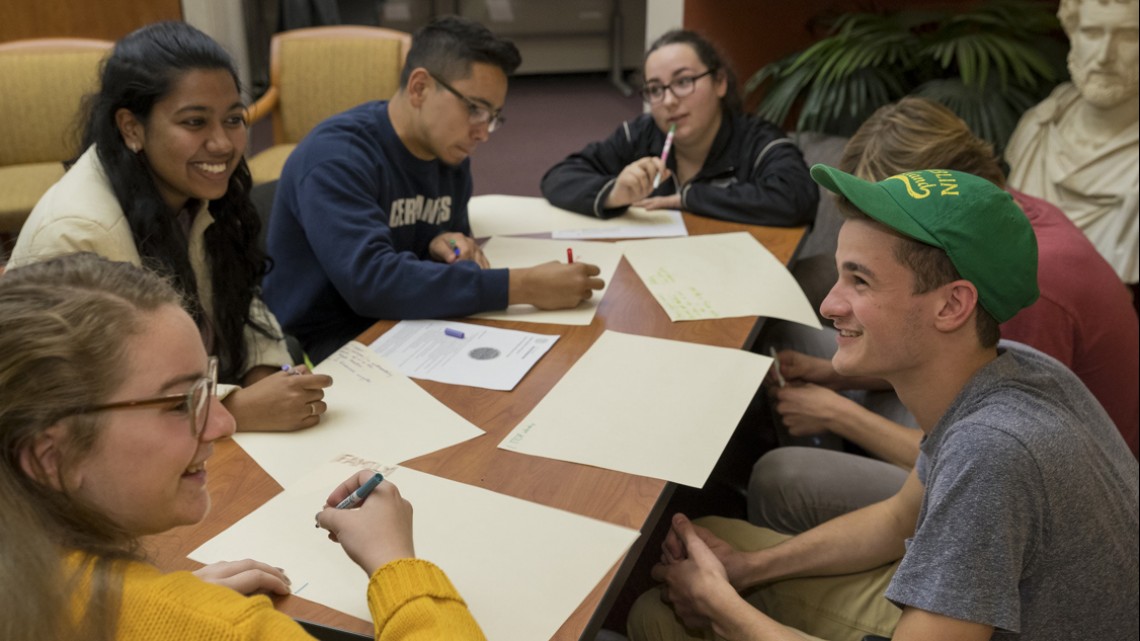
Students participate in a small-group advising seminar.
New programs aid first-generation Arts and Sciences students
By Kathy Hovis
Expanding its efforts to support first-generation, low-income students, the College of Arts and Sciences will offer three new programs, starting this summer – a Summer Scholars Institute and small-group advising seminars for first-year students, and a guaranteed summer internship program for sophomores.
The college is also increasing the number of spots available to first-year students in Cornell’s six-week Prefreshman Summer Program (PSP), starting this summer. PSP helps students prepare for the challenges of their freshman year through summer-session courses, enrichment courses or a college-achievement seminar.
“Our goal is to provide tailored academic and career mentoring to first-generation students that introduces them to the culture of higher education, supports their well-being and unlocks growth opportunities they might not otherwise know how to access,” said Bonnie Comella, assistant dean and director of advising for the College of Arts and Sciences.
Last year, Cornell offered more than $239 million in grants. The average grant award for a first-year student in the Class of 2021 was $40,686, with the high being $76,997.
About one in eight students in Arts and Sciences is a first-generation student. These students lack some guidance and high school experiences, which makes the transition to the rigor of Cornell’s curriculum more difficult, she said.
The Summer Scholars Institute will support 20 students with a one-week residential experience, said Paul Sulzer, the advising dean who designed and directs the program. Participants will sharpen their reading and writing skills at workshops conducted by the John S. Knight Institute and take part in career development, health and wellness, public service and financial literacy activities, Sulzer said. They will also: reflect on their first-generation identity and the challenges and opportunities that brings; meet faculty, staff and students who will support their Cornell journey; be introduced to Cornell history and traditions; and take part in field trips to local state parks and Ithaca summer events.
“The Summer Scholars Institute allows participants additional time to digest the scene they will be in when they return for New Student Orientation in August,” Sulzer said. “Students will also get to develop close connections with other first-gens.”
First-generation students will also benefit from a new guaranteed Pathways Internship Program, which will connect them to positions the summer after their sophomore year. Starting this fall, eight sophomores selected for the program will work with senior career associate Ana Adinolfi, who will guide them through the process of finding an internship. They will meet with career counselors monthly and complete resumé reviews and mock interviews, and be mentored as they research potential employers and undertake the application process, Adinolfi said.
“We’re evening out the access of first-generation students with their peers who might have networking opportunities, or a different level of understanding about what goes into an internship search process,” Adinolfi said.
The students will also receive grants of up to $8,000 to offset expenses from these summer experiences, which are often unpaid.
A third resource for students will be weekly small-group advising seminars.
In the fall 2017 semester, six groups of 10 students each met with their faculty adviser once a week, discussing time management, the opportunities of the liberal arts curriculum and navigating Cornell. Those meetings continued this spring for 30 first-year, spring-admission students in the college. This fall, close to 500 students will be paired with 50 faculty members; ultimately, all first-year students in the college will be included.
“Many of us in the college – faculty, staff, alumni and students – are first generation ourselves and we understand what it takes to adjust to and persist at Cornell,” Comella said. “Providing the support and resources students need to reach their academic and career goals, and knowing that they aren’t going through it alone, is key to their success.”
Kathy Hovis is a writer for the College of Arts and Sciences.
Media Contact
Get Cornell news delivered right to your inbox.
Subscribe
